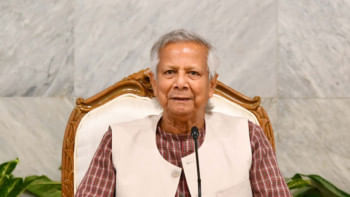UN road transport conventions vital to implement BBIN deal
The UN Road Transport Conventions such as "Transports Internationaux Routiers" (TIR) could help the effective implementation of this BBIN agreement to improve the trade and connectivity among the signatory countries in South Asia.
Although the much talked about Bangladesh Bhutan India and Nepal (BBIN) Motor Vehicle Agreement was signed in 2015 to ensure seamless movement of transport but it is yet to be implemented as Bhutanese parliament did not ratify it until now.
AK Azad, vice-president of International Chamber of Commerce-Bangladesh (ICC-B), made the comments at a virtual discussion on "UN TIR" system and its benefits of expansion to Bangladesh and other BBIN countries.
The ICC-B, the Federation of Indian Chambers of Commerce and Industry (FICCI) and International Road Transport Union (IRU) organised the event.
The ICC-B president also said the TIR system can be implemented for more connectivity and for more trade among the BBIN nations under some understanding on customs.
Further, the intermodal aspect of TIR system, that encompasses rail, sea and air would also play an important role in connecting this region to the world, Azad also said.
Under the TIR, since there will be minimum checks by the customs at the land customs stations while posing no risk to the revenue in the light of well-defined and robust monitoring implemented under the guidance of the IRU.
The TIR system adopted by IRU is time tested and is being successfully followed by nearly 70 countries. Bangladesh, India, Bhutan, Nepal maintain their international trade relations with each other and indulge on bilateral trade and hence the trade is asymmetric.
Like, Bhutan and Nepal have string trade relations with India and hence some of their trade is with India whereas Bangladesh's bilateral trade Bhutan and Nepal remains at less than one-tenth of total trade despite their close geographic locations.
A seamless transport connectivity between India and Bangladesh has the potential to increase national income by as much as 17 per cent in Bangladesh and 8 per cent in India, the World Bank said in its latest report.
Kazem Asayesh, senior adviser of the IRU, said currently 77 countries are signatories of the TIR system and in 64 countries the system is operational in transportation of goods with involving 34,000 transport and logistics.
PS Pruthi, senior consultant of the FICCI, hopes Bangladesh will implement the TIR system to ease the trade between Bangladesh and India.
India has already implemented the TIR system, he said.
Shankar Shinde, chairman-elect of the Federation of Freight Forwarders' Associations in India, said there is no problem in using the TIR system in trade between Bangladesh and India although the BBIN has not been made functional yet.
Kabir Ahmed, president of Bangladesh Freight Forwarders' Association, said TIR system can be a tool for wider connectivity among the BBIN nations. Satish Kumar Reddy, consultant of the Asian Development Bank, said since Bhutan did not ratify the BBIN yet so it is now a three nations' issue.
So a political willingness is needed of the respective countries for implementing the TIR system. However, TIR can be an alternative way for wider connectivity and trade among the participating countries, he said.
Md Khairul Kabir Mia, first secretary for customs, international trade and agreement of the National Board of Revenue, and Satyajit Mohanty, joint secretary and commissioner of customs the government of India, also spoke.

 For all latest news, follow The Daily Star's Google News channel.
For all latest news, follow The Daily Star's Google News channel. 



Comments